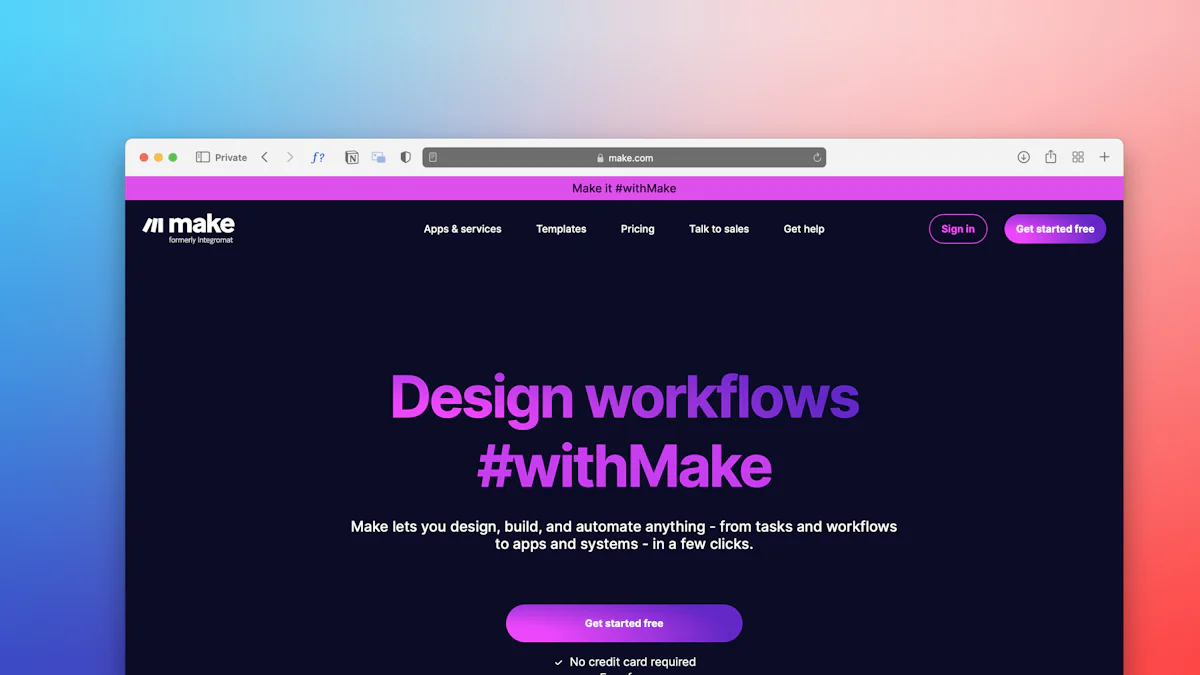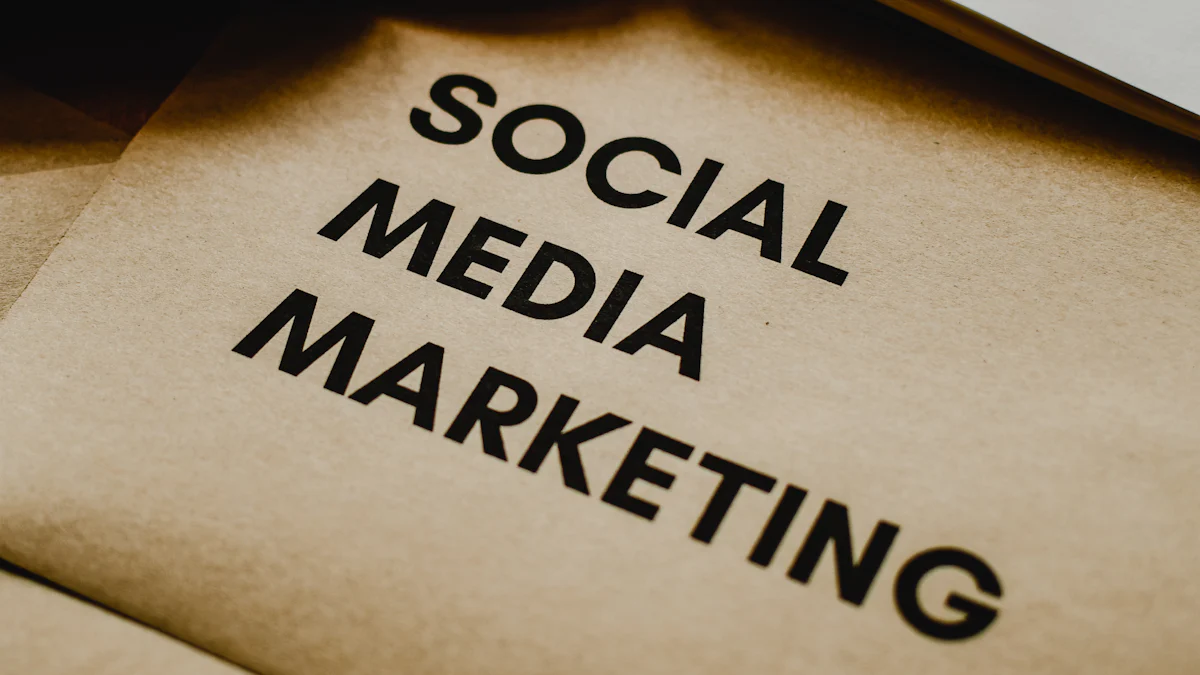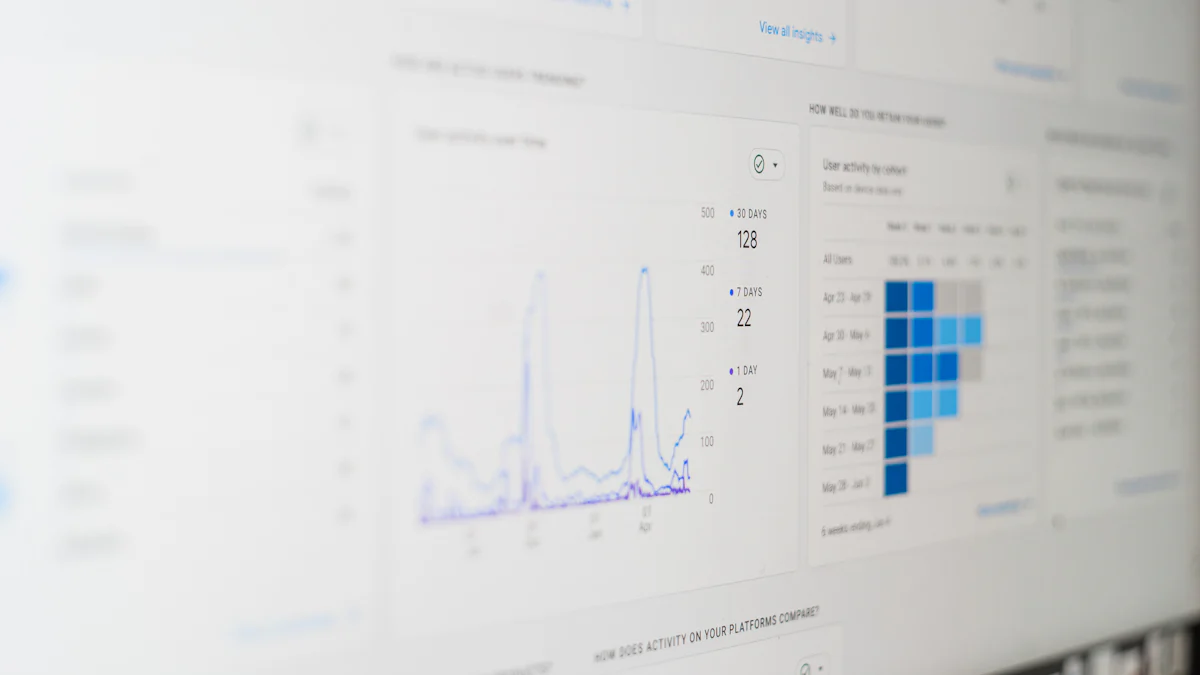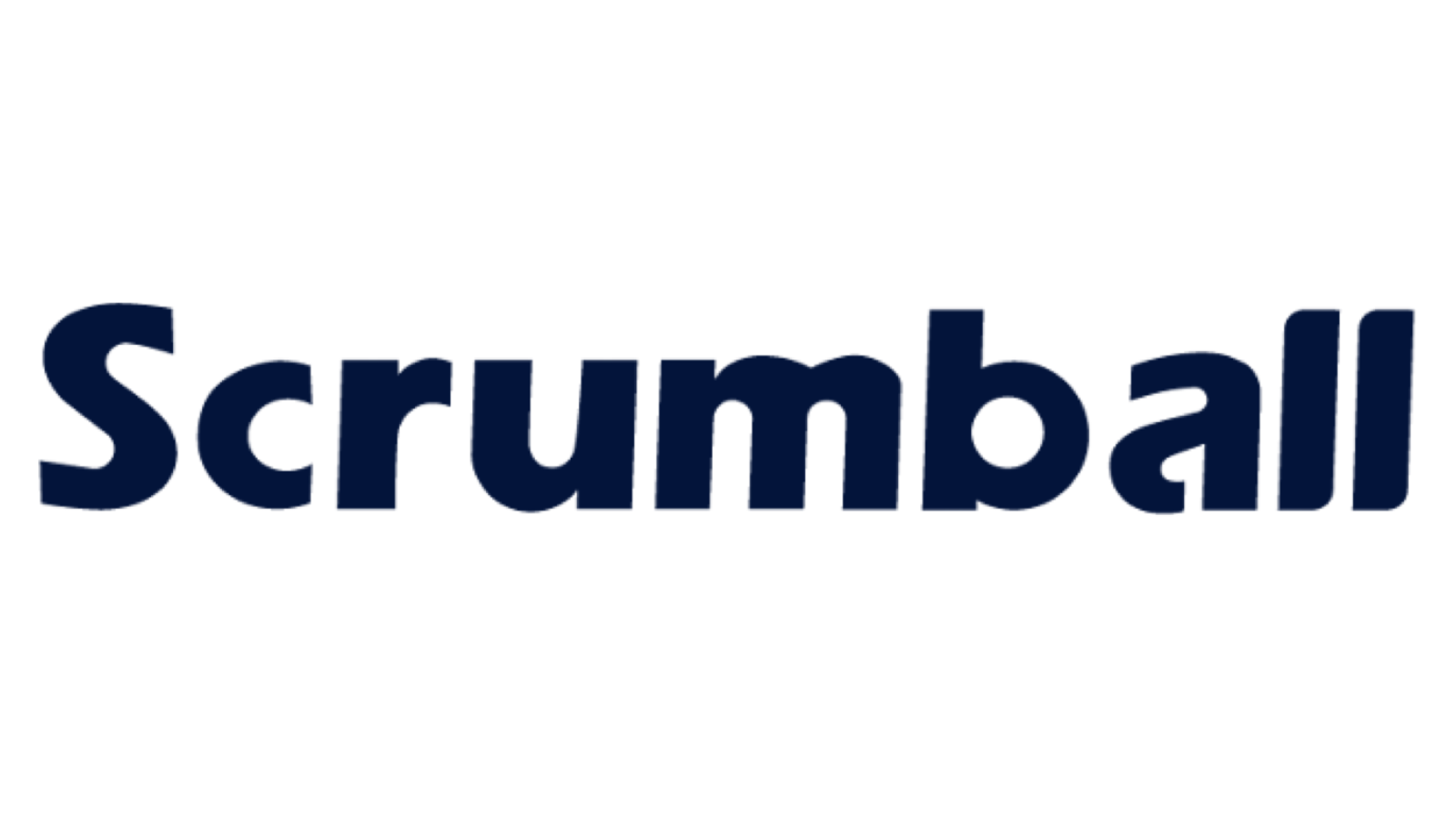Top Digital Marketing Automation Platforms Compared for 2025

Digital marketing automation platforms have become essential tools for businesses in 2025. With the market value exceeding $8 billion and 79% of companies already using these platforms, their adoption continues to grow rapidly. These systems streamline repetitive tasks, allowing your team to focus on strategic goals. By choosing the right marketing automation system, you can nurture leads effectively, improve productivity, and achieve measurable results. Businesses report an average ROI of $5.44 for every dollar spent, making these platforms critical for maximizing ROI and staying competitive in a fast-evolving market.
Key Considerations for Choosing a Marketing Automation System
Business Size and Type
Small Businesses
Small businesses often need marketing automation platforms that are easy to use and cost-effective. You should look for solutions with intuitive user interfaces and essential features like email marketing and lead management. HubSpot's all-in-one approach is a great option for small to medium-sized businesses. It offers seamless integration and scalability as your business grows. ActiveCampaign is another excellent choice, focusing on customer experience and providing affordable plans tailored to smaller teams.
Enterprises
Enterprises require platforms that can handle complex workflows and large-scale campaigns. Marketo Engage stands out for its scalability and advanced features, making it ideal for managing intricate marketing strategies. Eloqua, with its integration into Oracle's suite of business applications, is a strategic choice for large organizations. These platforms also offer robust analytics and reporting tools to track performance across multiple channels.
B2B vs. B2C Marketing Needs
Features for B2B
B2B businesses need platforms that prioritize lead qualification and nurture campaigns. Features like CRM integration and detailed analytics are essential for tracking customer behavior and maintaining engagement throughout long sales cycles. Salesforce Marketing Cloud and Pardot excel in these areas, offering tools to educate and share value with prospects.
Features for B2C
B2C businesses benefit from platforms that focus on personalization and high-volume outreach. You should choose solutions that deliver tailored messages and track individual customer journeys. Platforms like ActiveCampaign and HubSpot are well-suited for B2C needs, offering tools to create engaging, omnichannel campaigns.
Budget and Pricing
Affordable and Free Options
If you’re on a tight budget, consider platforms with free or entry-level plans. These often include basic email marketing and lead management features. For example, HubSpot offers a free plan with limited functionality, while ActiveCampaign provides affordable options starting at $15 per month.
Premium and Enterprise-Level Solutions
For advanced features and scalability, premium plans are worth exploring. Pricing models vary, with monthly fees ranging from $100 to over $2,000, depending on the platform and features. Marketo and Eloqua cater to enterprises with comprehensive plans that support large-scale operations.
Integration and Scalability
Compatibility with existing tools
When selecting a marketing automation platform, you must ensure it integrates seamlessly with your existing tools. CRM integration is one of the most critical aspects to consider. Platforms like HubSpot and Salesforce Marketing Cloud excel in this area, offering smooth connections with popular CRM systems. These integrations allow you to centralize customer data, streamline workflows, and improve team collaboration.
You should also evaluate compatibility with other essential tools, such as email marketing software, analytics platforms, and e-commerce systems. For example, ActiveCampaign provides robust integrations with third-party apps, making it a versatile choice for businesses with diverse needs. A lack of compatibility can lead to inefficiencies, data silos, and missed opportunities to optimize your marketing efforts.
Scalability for future growth
As your business grows, your marketing automation platform must scale with you. Scalability ensures that the system can handle increased data, users, and campaigns without compromising performance. However, businesses often face challenges when scaling their platforms:
- Limited resources may require additional investments in technology, training, and personnel.
- Managing large volumes of data demands accuracy, consistency, and security to avoid disruptions.
- Integration complexities can arise, requiring seamless data flow between systems.
- Workflow optimization becomes essential to maximize efficiency and address bottlenecks.
Platforms like Marketo Engage and Salesforce Marketing Cloud are designed for scalability. They offer advanced features and flexible plans to support your growth. CRM integration plays a vital role here, enabling you to maintain a unified view of your customers as your operations expand. By choosing a scalable platform, you can future-proof your marketing strategy and adapt to evolving business needs.
Comparison Guide to Top Marketing Automation Platforms

HubSpot Marketing Hub
Key Features
HubSpot Marketing Hub stands out as one of the top marketing automation platforms due to its all-in-one solution and ease of use. You can manage email marketing, social media, and lead nurturing from a single platform. Its strong customer support ensures you receive help when needed. Unlike many competitors, HubSpot allows you to customize workflows without requiring developer skills. It also integrates seamlessly with inbound marketing methodologies, making it ideal for businesses focused on attracting and engaging leads.
| Feature | HubSpot Marketing Hub | Competitors |
|---|---|---|
| All-in-one solution | Yes | Varies |
| Ease of use | High | Moderate to Low |
| Strong customer support | Excellent | Varies |
| Customization without developer skills | Yes | Limited |
| Inbound marketing methodology integration | Yes | Not always |
Pricing Overview
HubSpot offers flexible pricing plans to cater to businesses of all sizes.
| Plan | Monthly Cost | Yearly Cost | Free Contacts | Additional Cost per Contacts | Key Features |
|---|---|---|---|---|---|
| Starter | $45 | $540 | 1,000 | $45 per additional 1,000 | Basic marketing tools, no branding |
| Professional | $800 | $9,600 | 2,000 | $224.72 per additional 5,000 | Advanced automation, omnichannel tools |
| Enterprise | $3,200 | $38,400 | 10,000 | $100 per additional 10,000 | Custom objects, revenue attribution |
Ideal Use Cases
HubSpot is perfect for small to medium-sized businesses seeking an intuitive platform with essential features. It also works well for companies prioritizing inbound marketing strategies.
Salesforce Marketing Cloud
Key Features
Salesforce Marketing Cloud is one of the top performing platforms for businesses needing comprehensive solutions. It enhances customer engagement through CRM integration and AI-powered campaign optimization. You can access real-time insights to make informed decisions and personalize experiences using data from multiple sources. This platform also supports seamless engagement across the customer lifecycle, driving growth and loyalty.
| Feature | Benefit |
|---|---|
| Comprehensive Features | Enhance customer engagement and streamline marketing processes. |
| CRM Integration | Connect marketing efforts with CRM for better data utilization. |
| AI for Campaign Optimization | Utilize AI to optimize campaigns and surface insights quickly. |
| Real-time Insights | Provide real-time insights for informed decision-making. |
| Personalization | Personalize experiences using data from any source in real-time. |
| Seamless Engagement | Drive growth and loyalty across the entire customer lifecycle with one platform. |
Pricing Overview
Salesforce Marketing Cloud offers a tiered pricing structure based on the number of marketing contacts.
- Monthly costs range from $1,250 to $15,000.
- Add-ons for advanced features can increase overall costs.
Ideal Use Cases
Salesforce Marketing Cloud is ideal for enterprises needing robust CRM integration and AI-driven insights. It suits businesses focused on delivering personalized, data-driven campaigns.
Adobe Marketo Engage
Key Features
Adobe Marketo Engage provides advanced tools for businesses requiring deep analytics and behavior tracking. You can create highly tailored marketing strategies and deliver consistent messaging across multiple channels. Its AI-powered personalization adjusts content dynamically to maximize conversions. Marketo also excels in account-based marketing (ABM), offering personalized experiences for strategic accounts.
- Deep analytics insight for campaign performance.
- Advanced behavior tracking for tailored strategies.
- Multichannel engagement for consistent messaging.
- AI-powered personalization for dynamic content.
- Seamless integration with sales and marketing tools.
Pricing Overview
Marketo's pricing aligns with enterprise needs, offering flexibility for different business sizes:
- Growth: Basic email marketing and automation.
- Select: Essential marketing automation and analytics.
- Prime: Lead-based marketing and AI personalization.
- Ultimate: Premium automation and advanced attribution.
The average annual cost is $112,544. Smaller businesses may start at $40,000 annually, while large corporations could pay over $1 million.
Ideal Use Cases
Marketo Engage is best for enterprises requiring advanced analytics, ABM, and scalable solutions. It suits businesses managing complex, multi-channel campaigns.
SharpSpring
Key Features
SharpSpring offers a comprehensive suite of tools that combines CRM and marketing automation. This all-in-one approach helps you streamline your tech stack and align sales with marketing efforts. Its intuitive interface makes it an excellent choice for businesses without extensive technical resources. You can implement advanced marketing strategies without needing a dedicated IT team.
Key features include:
- Behavioral-based email automation: Create personalized campaigns based on user actions.
- Dynamic landing pages: Build and optimize pages to improve lead conversion rates.
- Social media management: Schedule posts and track engagement across platforms.
- Visitor ID tracking: Identify anonymous website visitors and convert them into leads.
- Customizable dashboards: Monitor performance metrics in real time.
Pricing Overview
SharpSpring stands out among top marketing automation platforms for its transparent and affordable pricing.
| Platform | Annual Cost | Monthly Cost | Onboarding Fee |
|---|---|---|---|
| SharpSpring | $11,988 | $999 | $1,999 |
| Act-On | $24,000 | $2,000 | $5,000 |
| Marketo | $33,300 | $2,400 | Varies |
| HubSpot | $38,400 | $3,200 | Varies |
SharpSpring offers plans tailored to different business needs:
- Small Business: $449/month for up to 1,500 contacts.
- Enterprise: $999/month for up to 10,000 contacts.
- Agency: Custom pricing based on client volume.
Ideal Use Cases
SharpSpring is ideal for small to medium-sized businesses and marketing agencies managing multiple client accounts. Its ease of use makes it suitable for companies new to marketing automation. Industries like professional services, real estate, and e-commerce benefit from its robust feature set.
Tip: If you want a cost-effective solution with CRM integration and marketing automation, SharpSpring is one of the top solutions to consider.
ActiveCampaign
Key Features
ActiveCampaign excels in providing tools tailored for small to medium-sized businesses. Its marketing automation capabilities allow you to create workflows based on subscriber behavior. You can also manage customer relationships and engage with them in real time.
| Feature | Description |
|---|---|
| Marketing Automation | Automates email campaigns and optimizes workflows. |
| Email Marketing | Enables targeted email creation and real-time performance tracking. |
| CRM Tools | Helps manage customer interactions and data effectively. |
| Live Chat | Facilitates real-time customer engagement. |
| Multichannel Marketing | Supports social media, ad campaigns, and custom landing pages. |
Pricing Overview
ActiveCampaign offers flexible pricing plans to cater to businesses of all sizes.
| Plan | Starting Price | Max Contacts | Key Features |
|---|---|---|---|
| Lite | $7.50/month | 100,000 | Email marketing, unlimited sends, 850+ integrations, chat and email support |
| Plus | $35/month | 25,000 | Advanced features, landing pages, SMS marketing, contact scoring |
| Professional | $79.50/month | 25,000 | Website personalization, predictive content, conversion reporting |
| Enterprise | $139.50/month | 10,000 | Unlimited users, HIPAA compliance, advanced personalization |
Ideal Use Cases
ActiveCampaign is perfect for small to medium-sized businesses looking for affordable and scalable marketing automation. It works well for companies focused on email marketing, CRM, and multichannel campaigns.
Note: ActiveCampaign’s pricing and features make it a strong contender among top marketing automation platforms for businesses with limited budgets.
Comparative Analysis of Marketing Automation Platforms
Feature Comparison
Automation and workflow capabilities
When comparing marketing automation platforms, automation capabilities play a crucial role in improving efficiency. You should evaluate how well a platform handles automated flows, such as email sequences, lead nurturing, and campaign orchestration. Platforms like HubSpot and ActiveCampaign excel in creating workflows that adapt to customer behavior. These tools allow you to automate repetitive tasks, freeing up time for strategic planning. Additionally, platforms like Marketo Engage offer advanced features for managing complex workflows, making them ideal for enterprises.
Analytics and reporting tools
Analytics and reporting tools are essential for tracking the success of your campaigns. You need platforms that provide detailed insights into customer behavior, campaign performance, and ROI. Salesforce Marketing Cloud and Adobe Marketo Engage stand out with their robust analytics features. These platforms help you make data-driven decisions by offering real-time insights and customizable dashboards. Tools like SharpSpring also provide visitor tracking and lead scoring, enabling you to refine your strategies effectively.
Pricing Comparison
Subscription tiers
Subscription tiers vary significantly across platforms. HubSpot offers flexible plans starting at $45 per month, catering to small businesses. In contrast, enterprise-level solutions like Salesforce Marketing Cloud and Marketo Engage can cost upwards of $1,000 monthly. ActiveCampaign provides affordable options for small to medium-sized businesses, with plans starting at $7.50 per month. You should choose a tier that aligns with your budget and required features.
Value for money
Value for money depends on the features offered at each price point. SharpSpring delivers excellent value with its all-in-one approach, combining CRM and marketing automation at a competitive price. HubSpot’s free plan is a great starting point for small businesses, while its premium tiers offer advanced tools for scaling operations. For enterprises, Marketo Engage justifies its higher cost with features like AI-driven personalization and account-based marketing.
Integration Capabilities
CRM and email marketing tools
Integration with CRM and email marketing tools is vital for streamlining operations. Pardot integrates seamlessly with Salesforce CRM, enhancing the sales process. Platforms like HubSpot and ActiveCampaign also offer robust CRM integrations, helping you manage customer data and sales pipelines efficiently. These integrations improve campaign orchestration by centralizing data and enabling targeted outreach.
Third-party app compatibility
Third-party app compatibility ensures your platform works well with existing tools. GetResponse supports over 100 integrations, including Shopify and WordPress, making it a versatile choice. HubSpot and ActiveCampaign also integrate with popular apps, allowing you to expand functionality as needed. This flexibility ensures your platform adapts to your business’s evolving needs.
Suitability for Business Types
Best for Small Businesses
Small businesses often require marketing automation platforms that are affordable, easy to use, and tailored to their specific needs. You should prioritize platforms that simplify workflows and provide essential features without overwhelming complexity.
Here are some top options for small businesses:
- Squarespace: This platform is perfect for small businesses focused on ecommerce. Its affordability and user-friendly interface make it a great choice for entrepreneurs and creative professionals. Squarespace also excels in creating visually appealing websites, helping you establish a strong online presence.
- BigCommerce Essentials: If your business sells a large volume of products online, BigCommerce Essentials offers powerful tools to manage your operations. It’s ideal for businesses experienced in online sales, providing features like inventory management and customizable storefronts.
- ActiveCampaign: This platform combines marketing automation with CRM tools, making it a versatile option for small teams. Its affordable pricing plans and robust email marketing features help you engage customers effectively.
Tip: Look for platforms that align with your business goals and offer scalability as your operations grow.
Best for Enterprises
Enterprises need platforms that can handle complex workflows, large-scale campaigns, and advanced analytics. You should focus on solutions that enhance operational efficiency and support data-driven decision-making.
Marketo Engage is a standout choice for enterprises. It offers advanced features like lead scoring and account-based marketing, which help you target high-value accounts effectively. Its scalability ensures that the platform grows with your business, making it ideal for managing intricate workflows.
Salesforce Commerce Cloud is another excellent option for large organizations. It provides enterprise-level features such as automated merchandising, dynamic pricing, and product recommendations. These tools streamline operations and enable you to deliver personalized customer experiences.
Note: Enterprise platforms often come with higher costs but deliver unmatched capabilities for managing complex marketing strategies.
By choosing a platform tailored to your business type, you can maximize efficiency and achieve your marketing goals.
Emerging Trends in Digital Marketing Automation Platforms

AI and Machine Learning Integration
AI and machine learning are transforming marketing automation platforms by enhancing efficiency and decision-making. These technologies automate repetitive tasks, such as email scheduling and lead scoring, freeing up your team to focus on strategy. They also analyze customer data to deliver personalized experiences, improving engagement and ROI.
- AI-powered assistants handle routine tasks, allowing you to allocate resources more effectively.
- Machine learning identifies potential customers with high purchase intent, helping you target the right audience.
- Real-time data optimization ensures campaigns adapt to changing customer behaviors.
By integrating AI, you can streamline workflows and improve customer journey tracking. This approach not only saves time but also ensures your campaigns remain relevant and impactful.
Enhanced Personalization Features
Personalizing customer experiences has become a cornerstone of modern marketing. Platforms now offer hyper-personalization, enabling you to create tailored content based on individual preferences. For example, dynamic content features in tools like HubSpot allow web pages and emails to adapt to each viewer.
- Account-based marketing (ABM) focuses on high-value accounts, customizing efforts to meet specific needs.
- Conversational marketing, powered by chatbots, facilitates real-time interactions for more meaningful engagement.
- AI-driven recommendations help customers discover products or services, similar to platforms like Amazon.
These advancements ensure your marketing efforts resonate with your audience, fostering stronger connections and higher conversion rates.
Omnichannel Marketing Capabilities
Omnichannel marketing capabilities are evolving to provide seamless customer experiences across multiple channels. Platforms like Emarsys simplify campaign execution by integrating data and deploying personalized messaging at scale.
Omnichannel tools also support lead segmentation and drip email campaigns, ensuring you engage your audience at the right time. By unifying your marketing efforts, you can maintain consistency and relevance throughout the customer journey. This approach enhances engagement and increases the likelihood of conversions.
Tip: Adopting omnichannel strategies ensures your brand remains visible and accessible, no matter where your customers interact with you.
Choosing the right marketing automation platform is essential for achieving your business goals. The comparison guide highlights how each platform caters to different needs, from small businesses to enterprises. You should focus on features like scalability, integration, and pricing to find the best fit. Start by evaluating your business size, marketing objectives, and customer engagement strategies. Explore platforms like HubSpot or ActiveCampaign if you need simplicity, or consider Marketo Engage for advanced analytics. By aligning your needs with the right digital marketing automation platform, you can streamline workflows and boost your marketing success.
FAQ
What is a digital marketing automation platform?
A digital marketing automation platform helps you streamline repetitive marketing tasks. It automates workflows like email campaigns, lead nurturing, and social media management. These tools improve efficiency and allow you to focus on strategic goals.
How do I choose the right platform for my business?
Start by evaluating your business size, marketing goals, and budget. Look for features like scalability, integration with existing tools, and ease of use. Platforms like HubSpot or ActiveCampaign work well for small businesses, while Marketo suits enterprises.
Are free marketing automation tools effective?
Free tools can be effective for small businesses or startups. They often include basic features like email marketing and lead tracking. However, as your business grows, you may need to upgrade to access advanced capabilities.
Can these platforms integrate with my existing tools?
Most platforms integrate with popular tools like CRMs, email marketing software, and e-commerce systems. Check compatibility before choosing. HubSpot and Salesforce Marketing Cloud offer robust integration options to streamline your operations.
How does AI improve marketing automation?
AI enhances marketing automation by analyzing customer data and optimizing campaigns. It personalizes content, predicts customer behavior, and automates repetitive tasks. This helps you save time and improve engagement.
See Also
Essential Influencer Marketing Platforms for 2024 Success
Best Influencer Marketing Tools for E-commerce Growth
Affordable Influencer Marketing Platforms to Consider in 2024
